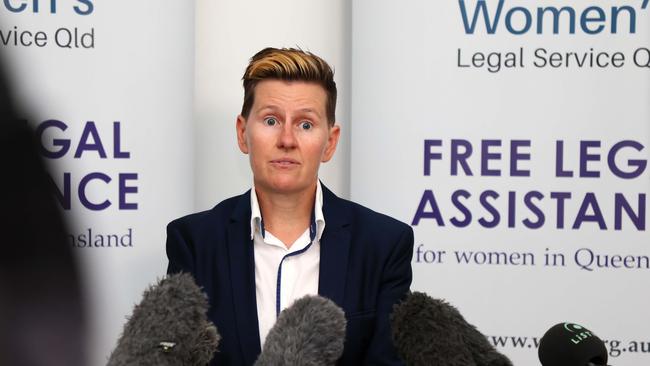DV survivors could be retraumatised as court wait times blow out
Experts warn increased delays in family and domestic violence cases being dealt with in higher courts in Queensland could retraumatise survivors.

QLD News
Don't miss out on the headlines from QLD News. Followed categories will be added to My News.
Wait times for family and domestic violence matters in Queensland’s higher courts have increased by 30 per cent over the past five years, with fears the blowout could lead to retraumatisation of survivors.
Australian Bureau of Statistics data reveals the number of domestic violence cases in higher courts has steadily risen, with processing times increasing from around 40 to 52 weeks in the last five years.
Wait times also peaked at an average of 55 weeks in 2024.
The types of family and domestic violence offences analysed included homicide, acts intended to cause injury, assault, sexual assault, abduction and harassment, stalking and harassment and threatening, property damage, breach of a violence order, and other dangerous or negligent acts.
Professor Silke Meyer from Griffith University’s criminology institute said higher courts nationwide had seen an increase in both matters and processing times.

It comes as the amount of cases finalised in magistrates courts had nearly doubled.
“Our magistrates courts [are] able to absorb that, obviously not be as bogged down by those matters and not showing a significant increase in processing times for victim survivors over the last five years,” she said.
Prof Meyer said the prolonged court processes “could lead to prolonged distress and retraumatisation” of victims.
She said “landmark inquiries” had increased awareness of domestic violence issues and encouraged victims to seek help.

“Court matters are distressing, overwhelming, traumatising for victim survivors to start with,” she said. “The longer that takes, the longer it places a barrier on victim survivor recovery while the court proceedings are ongoing.”
Women’s Legal Service Queensland CEO Nadia Bromley said victims spent too long in the justice system.
“I think part of it is about resourcing and making sure that there are adequate results and there have been new judges appointed … changes to the processes, but unfortunately, I don’t think we can see that resolved in the short term,” she said. “But even so, if it is the volume of matters that’s causing delays, then potentially resourcing could address that too. I suspect that’s across the board, in terms of resourcing the frontline investigators, the DPP, right up through to the actual judiciary.”
Laws making coercive control a criminal offence will come into effect on May 26.
One survivor who spent four years navigating the legal system and incurred $200,000 in legal fees said perpetrators could exploit the system.
“You’re dealing with someone who wants to continue to hurt and control you and so therefore one of the ways they do that is by me continuing to pay expenses in legal fees, every time a lawyer writes a letter, or you speak to them on the phone,” she said. “We were getting no response, we tried to get mediation dates and there would be delays from him not agreeing to those dates. They can play the system.”
She said she felt it was “really damaging for women sitting in legal disputes for years.”
Originally published as DV survivors could be retraumatised as court wait times blow out


